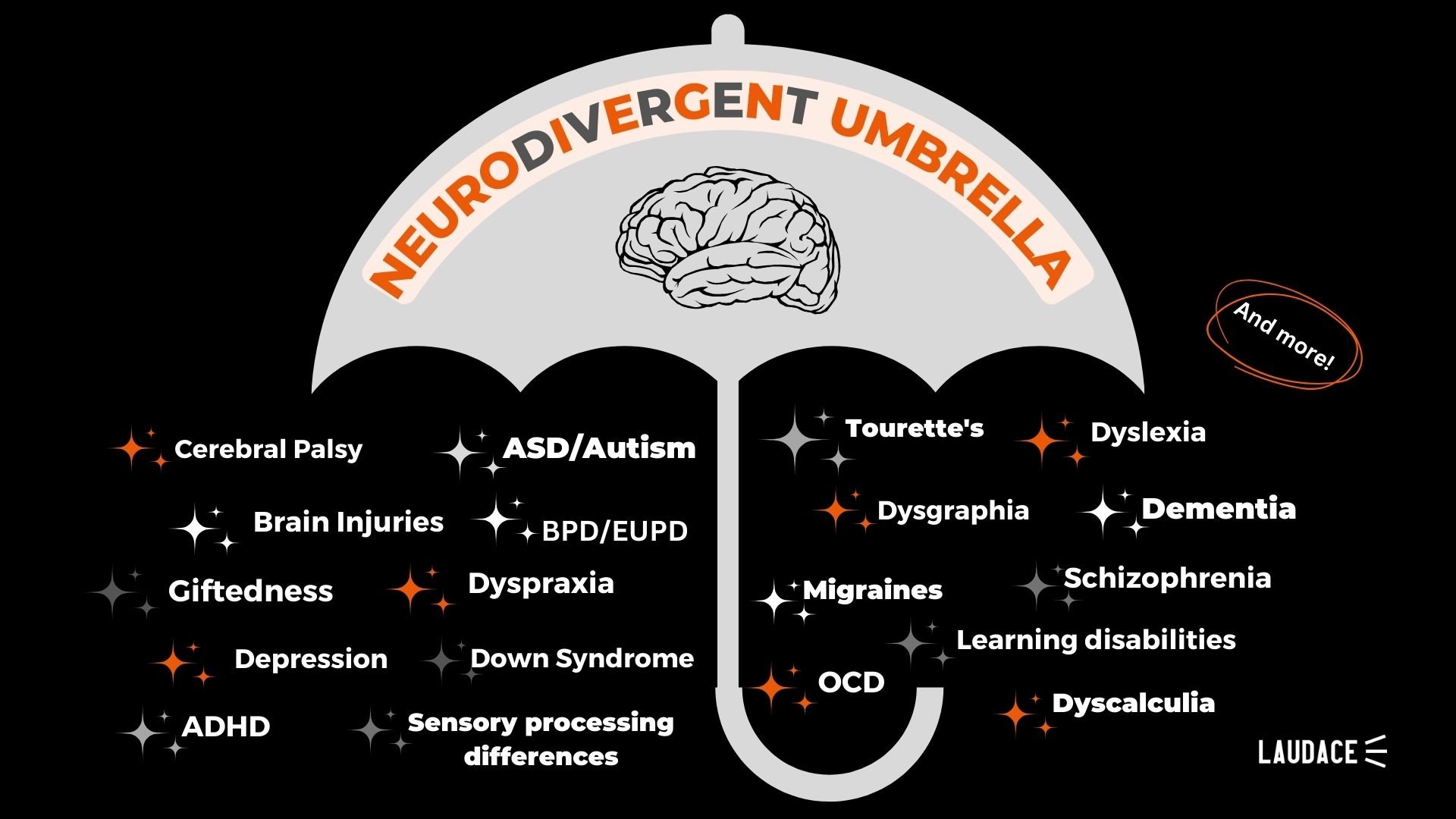The Quest for Inclusive Neurodiversity Advocacy
In March, many social media posts celebrated Neurodiversity Celebration Week. While it's good to see more discussion about Neurodiversity, performative efforts run the risk of reducing Neurodiversity to another buzzword.
20-22% of people identify as Neurodivergent within the EU (1), and yet most of the representation we see predominantly online reflects the experience of folks with Autism or ADHD, amongst other conditions. These narrow representations often amplify exciting euro-centric neurodivergent experiences, further invisibilising those already on the margins of society. When we ignore the impact of factors like race, gender, and age on diagnosis rates and available support, we are reproducing harmful barriers for those who are most marginalised within neurodivergent groups.
This blog post will explore the challenges in neurodiversity efforts, addressing the lack of intersectional representation and systemic inequities in scientific research and healthcare, hindering support and belonging for Neurodivergent individuals.
Kassiane Asasumasu, who coined the term "neurodivergent," emphasised that:
“Neurodivergent refers to neurologically divergent from typical,” which includes “Autistic people. ADHD people. People with learning disabilities. Epileptic people. People with mental illnesses. People with MS or Parkinsons or apraxia or cerebral palsy or dyspraxia or no specific diagnosis but wonky lateralisation or something.”
As she goes on, then: “It is not another damn tool of exclusion. It is specifically a tool of inclusion.” (2)
The umbrella of Neurodivergence includes all of these conditions and more!
What is causing the narrow representation of Neurodivergent individuals?
Television often shows a narrow view of neurodivergent people. A popular show like 'The Big Bang Theory' portrays a character, Sheldon Cooper, as the typical autistic person. Other shows like 'The Good Doctor' and 'Rain Man' also have similar characters. These portrayals suggest that society only values neurodivergent individuals who are highly intelligent and successful in specific fields.
As a result of this, Neurodivergent individuals with higher support needs are often excluded from the neuroinclusion conversation. While people with less sensationalised neurodivergent conditions are further invisivibilised in their quest for belonging. This also translates to the derogatory use of terms like "Bipolar" and "psychotic" in everyday interactions which adds to the stigma and misunderstanding surrounding neurodivergent conditions.
Furthermore, the exponential growth of ADHD discourse on social media, reinforces growing stigmatisation and dismissal of genuine challenges of ADHDers. While it’s common to hear "everyone has ADHD" nowadays, this oversimplification downplays the challenges faced by those with ADHD. It is imperative to move beyond superficial representations and foster a deeper understanding of the complexities and nuances inherent in neurodiversity, ensuring that everyone receives the support and recognition they truly deserve.
How is the Scientific community failing Neurodivergent folk?
The lack of genuine representation is also reflected in scientific research (3). A glaring deficiency persists in understanding and addressing neurodiversity from an intersectional lens. 80% of research conducted in the psychology field is researched in W.E.I.R.D demographic groups. The acronym W.E.I.R.D. stands for western, educated, industrialised, rich and democratised, a demographic only accounting for 12% of the global population (4). Subsequently, insights deriving from these populations cannot be generalised to meet the diverse ranges of needs within the neurodivergent population. Moreover, these incomplete assessments of neurodivergent manifestations in folks from historically marginalised groups exacerbates access to earlier diagnosis’ and often exposes them to medical gaslighting and lack of support.
In the future, it is essential to adopt an intersectional approach to researching Neurodiversity so that more neurodivergent women, people of colour and queer folks’ fundamental disability rights are met. We should leave no one behind.
So what can we do?
Individually: Challenges assumptions and throwing away stereotypes
Be the change you want to see in your communities by broadening your viewpoint and learning from a diverse range of Neurodivergent perspectives. YouTube is a great place to start, with many Neurodivergent people sharing their lived experiences and insights. We are contributing to highlighting these experiences through Flip The Neuro-tive, LAUDACE’s first interview series amplifying the stories of Neurodivergent people from their own lens (5).
In addition, there are many educational resources (6) like books and articles which can help you develop your neurodiversity knowledge.
Societally: unlock resources and centre historically marginalised voices
With 1 in 5 of us suspected to be neurodivergent (1), they are undoubtedly amongst you too. Creating lasting impact can be achieved through the work of communities, so join forces with others to make the Neurodiversity movement more inclusive. If you’re working for a company, employee resource groups can provide a platform for advocacy and support.
Furthermore, it is crucial to centre the experiences of marginalised neurodivergent communities. Amplify their voices and ensure their concerns are prioritised in discussions and decision-making processes.
Finally, if you are in The Netherlands, join our Courageous Conversation series hosted at Bat Bario and Equals, where we will be discussing the Neurodivergent experience of BIPOC folk and The Invisible Weight of Late Diagnosis this month.
At Laudace, we are committed to empowering communities & organisations to become equity-driven and intersectionality-focused through our ED&I Education, ED&I consultancy and Courageous Conversations Series solutions to foster more inclusive cultures, empower marginalized voices, and social impact.
If you're ready to make a real impact on your teams or communities, contact Laudace today. Together, we can ignite a positive transformation within your organization and create a more equitable world.
Sources


